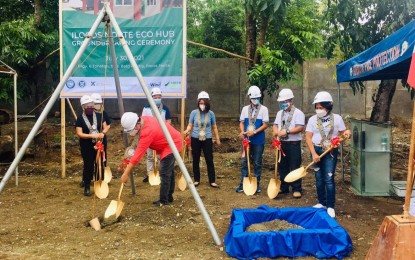
RECYCLING FACILITY. Officials of the provincial government of Ilocos Norte and Piddig town, together with those from Green Antz Builders, break ground for an eco hub recycling facility in Barangay Tonoton, Piddig, Ilocos Norte on Friday (July 30, 2021). The facility will convert plastic wastes into ecobricks for construction projects. (Photo courtesy of ENRO-Ilocos Norte)
LAOAG CITY – Residents and officials of Ilocos Norte look forward to converting discarded plastic materials into ecobricks which are even more durable than regular hollow blocks for construction projects.
An eco hub facility will soon rise for this purpose in Sitio Bato, Barangay Tonoton of Piddig town, a joint undertaking of the Ayala-led renewable energy corporation, Green Antz Builders, with the provincial and municipal governments.
Once fully operational, the facility, which broke ground last Friday, will be collecting and reusing discarded plastic materials and transform them into valuable resources like ecobricks for houses and buildings.
Estrella “Baby” Sacro, head of the provincial Environment and Natural Resources Office, said in an interview on Sunday that the project is in response to the global plastic waste pollution problem.
Despite an aggressive campaign against plastic pollution, some residents in the province just discard their plastic waste elsewhere or worst, burn them in their backyards.
“We hope that the facility will not only provide jobs for the locals but also inspire more people to segregate their wastes properly,” she said.
The facility will eventually improve the reduction of waste at source while lengthening the life span of the towns and cities' sanitary landfills, she noted.
According to the World Business Council for Sustainable Development, the global demand for plastic will continue to grow and is likely to double in the next 20 years.
However, only 9 percent of the total plastic produced is being recycled hence, it is estimated that 8 million tons of plastic leak into the environment. Packaging is the largest application of plastics globally, creating a growing societal pressure for companies to adopt circular models with no waste.
With appropriate technology, plastic products are broken down into pieces and mixed with cement and sand to produce ecobricks.
Prior to the approval of the said project, Green Antz chief executive officer Rommel Benig, in his presentation before members of the Ilocos Norte Provincial Board, said one ecobrick may consist of 50 to 100 plastics and is five times stronger than a typical hollow block.
While ecobricks are more expensive per unit compared to traditional bricks, these reduce the overall cost of building construction and operation.
They also allow for greater insulation, thus, drastically reduce energy consumption, resulting in lower electricity costs and environmental impact.
Some of the finished products have been tested in the construction of pavement in a school in Pagudpud, as well as in other parts of the country.
Aside from the eco hub facility, the Ilocos Norte government, with the support of the Department of Environment and Natural Resources, is also in the process of constructing a PHP24-million model cluster plastic recycling and resource recovery facility in Marcos town.
Meanwhile, each city and municipality of the province has received a garbage compactor from the provincial government to address the problem of garbage collection and disposal. (PNA)
